Premium Only Content
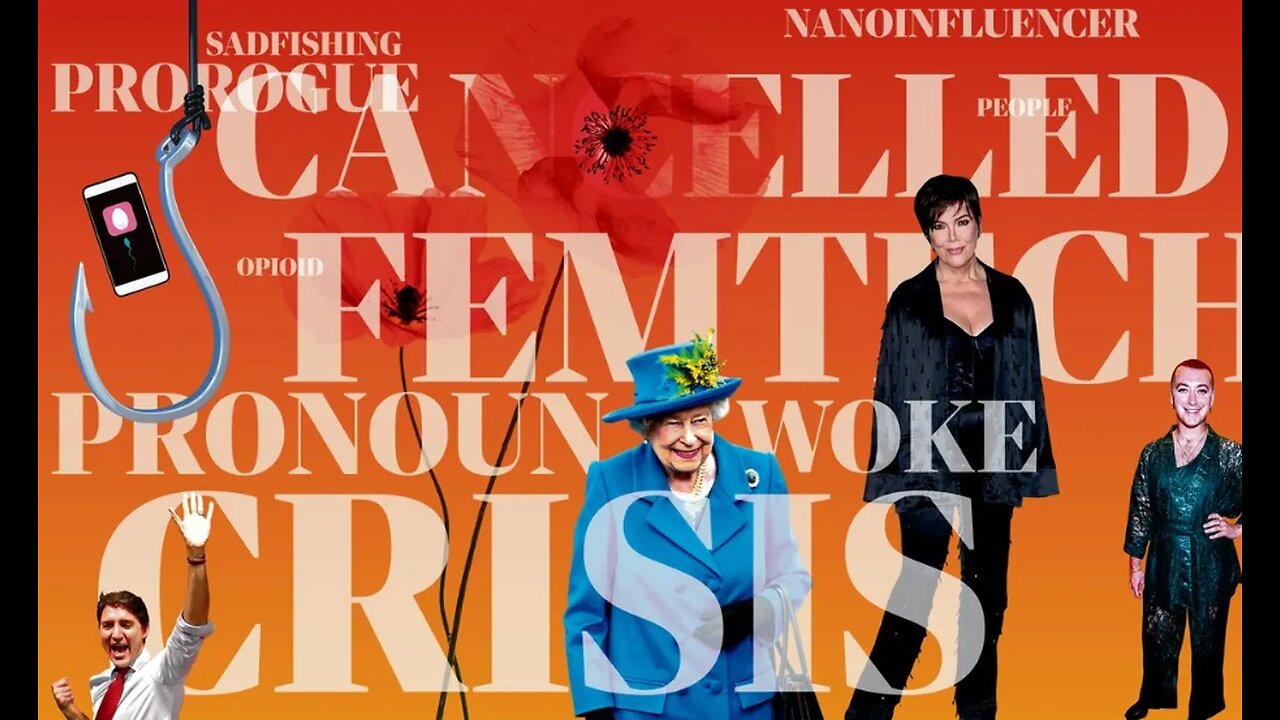
Nana Akua Black Lives Matter Is A Scam Say Kanye West And Glossary of Woke Terms
Nana Akua Video Black Lives Matter Is A Scam Say Kanye West called the Black Lives Matter movement a “scam” after wearing a White Lives Matter shirt to his surprise Yeezy fashion show. “Everyone knows that Black Lives Matter was a scam now it’s over you’re welcome,” he wrote on his Instagram Story Tuesday morning. The statement came after the fashion designer wore the headline-making top, which featured the pope’s face on the front, alongside just-as-controversial political commentator Candace Owens at Monday’s Paris Fashion Week presentation.
Some of the models in his show wore the same shirt emblazoned with “White Lives Matter” on the back, causing fans and celebrities to react on social media. Jaden Smith, who attended 45-year-old West’s show, left early upon seeing the messaging.
Kanye is right: Black Lives Matter was always a scam Kanye West only really cares about getting attention. But even the worst attention hog can stumble across a good point: Black Lives Matter was a scam from the beginning.
“Everyone knows Black Lives Matter was a scam,” West said. He's right. The Black Lives Matter movement was built on the lie that Michael Brown was a poor, defenseless victim of a racist police officer in Ferguson, Missouri, in 2015. The myth that he submitted and was shot anyway — “Hands up, don’t shoot” — was a lie. Physical evidence showed that Brown attacked Officer Darren Wilson and attempted to get his gun before he was shot.
SEE IT: YE CALLS BLACK LIVES MATTER MOVEMENT A SCAM
Democratic politicians wanted to stoke the flames of racial division heading into the 2016 election, and so they indulged the fiction that Brown was some kind of victim or martyr. But the Justice Department, under Attorney General Eric Holder and President Barack Obama, confirmed that Wilson did nothing wrong.
Despite being built on a lie, Black Lives Matter became the hobbyhorse of Democratic politicians, celebrities, and establishment media. Whenever an unarmed black person was shot by police — it happens slightly less often than unarmed white people getting shot by police, according to the Washington Post police shooting database — the media go out of their way to make it a national story. Sometimes, they'll even make it a national story if the person in question was armed and dangerous.
Even incidents that spawned justifiable outrage were then warped to portray all police officers as racists and to insinuate that society at large is to blame for these deaths. But they aren't. Police are not racists who hunt black people.
Ignored by Black Lives Matter were the thousands of black lives that didn’t matter to activists. The Washington Post database lists 145 unarmed black people killed by police since 2015. Some of those unarmed cases include incidents like Brown’s, but unmentioned go all the black people murdered by non-police officers every year. In 2019 alone, for example, 7,484 black people were murdered. Democratic politicians and activists will mourn a criminal like Brown, but 7,000 black murder victims killed by non-police just don't matter.
And then, of course, there is the actual financial scam. A Washington Examiner investigation found that millions in funds had gone unaccounted for at the Black Lives Matter organization. California and Washington, two states run by Democrats, ordered the organization to cease all fundraising. The BLM Global Network Foundation took in $77 million in 2020, which then went on to line the pockets of its executives and their families. That $6 million mansion in Los Angeles was necessary for racial justice, don’t you see?
From the beginning, Black Lives Matter was a scam. The movement was built on a lie and was channeled toward anti-police sentiment, exploited by Democratic politicians who think stoking racism helps them and know that talking about the homicides in the cities they run would not. The financial scam was simply the icing on the cake of the political scam, and it’s a scam that Democratic politicians and liberal activists (and journalists) will continue to push without a hint of regret or introspection.
A glossary of terms you need to stay woke in 2019 “That’s what I hate about the times we live in, the terms,” a hapless Ellie Guggenheimer once said, forever immortalized in Tom Wolfe’s “Radical Chic,” a biting ’70s report about upper class society members appropriating street politics. It seems like every time there’s any sort of political pushback on words, there will always be well-meaning people who, struggling to keep up, become averse to society’s new lexicon and the changing times of politics. And of course, these two come hand-in-hand; a large-scale social awakening necessitates a change in language.
By now, it seems obvious that the same thing is happening. When we look back at 2018, there’s one thing that we can say for sure: everyone got a lot more political. Maybe it’s because we have more skin in the game (with dictators and would-be dictators in power, everyone’s rights are in question), or maybe we’ve just evolved as a people. 2018 became the year of power and anger, of visibility and acceptance. LGBTQA+ representation shot up. Victims of sexual abuse and rape, instead of being sent to the lion’s den like they would’ve been in other years, were lionized. The political and social landscape no longer had a place for complacency.
Of course, that’s not to say that the entire world became a liberal paradise. Authoritarianism continued to rise globally, the alt right still existed in droves, rapists were acquitted and put into power, and Imelda Marcos was allowed to place bail to evade jail time. Still, it’s fair to say that the tides are turning. For some perspective, when I was in high school, I was the lone brazen feminist, and I couldn’t say the word “queer,” even though that was what I was. I was also very uncool, the killjoy that wasn’t okay with slut shaming or rape jokes. Now, to be ignorant is to be passé.
So for 2019, we’ve alphabetically compiled a list of terms that you’ll need to know going in to the year. Something to note though: when you use these terms, do it out of a genuine desire to make the world a better place. If you’re scrolling through this list just to appear woke to your internet friends, then you’ve defeated the point. Be radical, not radical chic.
Also, while we tried to be as comprehensive as possible, we won’t pretend that this list is exhaustive. If you think there’s a term we need to add or define, let us know in the comments section below.
Cultural appropriation
Cultural appropriation is when you take elements or use items from another culture without asking permission from the said culture. In itself, the practice is neither inherently good nor bad. However, the act becomes ethically dubious once the person borrowing is from a dominant culture—especially if that culture has a history of colonialism or systemic oppression against the culture the person is borrowing from. It’s definitely wrong if the item or element borrowed is considered sacred by its original culture and the borrower uses it in a way that does not preserve its sanctity. Also wrong: when the borrowing becomes exploitation, or when the borrowed item is used to reinforce racist stereotypes.
Some people argue that the term cultural appropriation itself only refers to when a dominant culture borrows from a minority culture, and that the neutral borrowing should be referred to as cultural exchange, or cultural appreciation. It’s a valid point, but I do believe that it turns the conversation about the practice into “this clearly isn’t appropriation, it’s appreciation!” and vice versa when oftentimes it’s not so black and white.
Identity politics
Identity politics zeroes in on how some groups, whether classified by sexuality, race, ability, or a combination of all three (thus “identity”), face more struggles, injustices, and systemic oppression than others, and it uses this lens as a way of discourse. Unfortunately, the term is often used by rightwingers as a blanket term for “millennial vaguely-leftish trash.” American politician Kamala Harris spoke up about how the right weaponized the term, turning it into a derisive phrase to “shut [people] up” and minimize important issues.
Inclusive
The opposite of exclusive or discriminatory. To be inclusive is to take pains not to exclude marginalized groups, whether it’s by advocating for captions in cinemas so that the deaf or hard-of-hearing can still watch a movie, or for free tuition at state universities so that the youth from disadvantaged communities get a chance to have good education.
Indigenous People
This is the more sensitive term to refer to the distinct ethnic groups who are the original settlers of a specific land or region. Think the lumad of Mindanao and Aeta of Luzon. It’s a tricky thing to define, so I’ll borrow the United Nation’s definition: “Indigenous peoples are inheritors and practitioners of unique cultures and ways of relating to people and the environment. They have retained social, cultural, economic, and political characteristics that are distinct from those of the dominant societies in which they live.”
Common to IP groups is marginalization. Across the board, IP groups are being forced off their land, stripped of their rights, exploited, treated as second-class citizens, and even killed by the dominant culture. Even in media, IP groups are not respected.
“Every time there’s a Filipino TV show and their characters [include] a Negrito or an Aeta, they become a comic character. And there’s also always this black girl who is not considered beautiful until her ‘blackness’ disappears,” says Maria Teresa Padilla, executive director of organization Anthropology Watch.
Intersectional
This refers to how various types of oppression are linked together. In previous years, there was a tendency for many to separate things like sexism and poverty, which only served to further marginalize people. For example, poor women with disabilities face even more oppression than their able-bodied peers of the same economic class, and treating their struggle in the same way disenfranchises them.
Gaslight
It’s a method of manipulation common to abusers. If you’re talking about its meaning in psychology, it’s when the abuser slowly undermines the victim’s perception and capabilities until the victim find themselves questioning their own sanity. Did you ever find yourself apologizing to an ex after they hurt you because they reasoned that you pointing it out hurt them more? Did that make you feel like you were the abusive, “crazy” one? If so, you were gaslit. This practice is emotional abuse.
However, the term has found its way to politics, too. It happens when someone in a position of power makes a baldfaced lie and barrages you into thinking it’s true, even when it so obviously isn’t, somehow creating an alternative reality in which they’re right. Did someone make a claim that was so obviously false and continued to pretend that they were right by insulting you for trying to correct them? Or how about Donald Trump’s efforts to destabilize truth? That’s gaslighting.
Marginalization
Marginalization happens when the ruling class or group treats minorities as insignificant or inferior, often by disenfranchising them of their rights. The act of marginalization is incredibly damaging, and is linked to systemic oppression.
Performative activism
This is the act of making a show of your activism. While there’s nothing wrong with being performative in itself, it becomes wrong when your activism is limited to that. Like the radical chic of the ’70s, it shows that you’ve adopted your activism merely to gain brownie points for yourself, and your public support is all for show. Again, not cool.
Representation
Representation has two meanings, both of which are incredibly important. The first is the depiction of a certain group, people, items, or concepts in media. Historically, representation of minority groups in popular media are rare, and when it does happen, it’s often negative. Think back on the many times our IP groups are depicted as nothing more than monkeys. Representation in this sense is important because media influences the way we perceive the world. Negative representation of minorities can and has encouraged discrimination, while positive representation not only gives the dominant majority a better understanding of those “different” from them, it also gives the depicted minorities a character that they could relate to, someone who actually looks like them, and someone they could see themselves in. The latter may not seem so important to those who are used to being portrayed in media, but it means a lot to those who aren’t.
Aside from representation in media, you also need political representation. This means having people from diverse communities be in seats of power in order to serve as their communities’ voice when it comes to issues that directly affect their respective communities. Without representation, politicians will be voting on things despite not knowing the actual needs of the community affected. For example, when there are so few women in Congress, women’s issues like reproductive health, abortion, the sin tax on napkins and tampons, will all be decided by old men who have no idea what women really need.
Systemic oppression
This refers to the ways a dominant culture is able to institutionalize the marginalization and discrimination of minority groups or cultures by embedding these unjust values into the political, social, and educational systems. It’s easy to imagine serious issues like homophobia, racism, and sexism in terms of individual cases because it gives you a single enemy to rally against; it’s easy to battle one homophobe, it’s impossibly difficult to dismantle a system that encourages the discrimination against people of the LGBTQA+ community. But it’s the latter that maintains the discriminatory norm. A few examples: what good is taking down one homophobe to me if, at the end of a day, I can’t marry a person I love because of our gender? What good is railing against people culturally appropriating indigenous weaves if we’re not at the same time making an effort to end the system that allows IP weavers to be exploited?
As columnist Christopher Ryan Maboloc puts it, because of systemic oppression in this country, “certain groups are stripped of the very opportunity to flourish in society, not because they are unable to on the basis of their lack of mainstream “quality” education or exposure to modern ways of life, but because they are deliberately pushed into obscurity by patronage politics and instrumentalist forms of learning that reduce knowledge to the technical.”
Whitewash
This is the practice of making nonwhite fictional characters or historical figures white, thus “whitewashing” them. In some cases, they do so by getting white actors to play as them while still acknowledging the character itself as nonwhite. This often leads to very racist portrayals of the character by way of blackface (in which actors put on makeup to give themselves black skin and exaggerated African features) or yellowface (in which actors use makeup and prosthetics to give themselves stereotypical Asian features). Some cases go the other way around completely erase the nonwhite identity of the character altogether.
Woke
Simply put, “woke” is slang for social awareness. Its use started within the African-American community, and became tied with the Black Lives Matter movement, with activists urging others to “stay woke.” After that, other people have appropriated it to mean awareness of other societal issues. However, because of how it’s been appropriated by the mainstream, many people have started to reject its usage.
Girl, boy, bakla, tomboy. The Philippines has a very specific gender and sexuality matrix: if you’re not a straight, masculine-presenting man, then you’re immediately gay—no matter if you’re actually a straight, feminine man, or an assigned male at birth transwoman. Gayness is its own gender identity, not just a sexuality. And if you don’t fit in to that restrictive matrix, it can feel like you’re either one of the last two options in the street chant, a butiki or a baboy.
To be clear, there’s nothing wrong with the term bakla itself, as long as that’s how you identify. What is wrong, however, is the idea that bakla is an all-encompassing term for any person born as male who is into men or have any feminine qualities, when it isn’t. Same thing with tomboy.
A year ago, the failings of the term came in full view when a woman’s tweet calling herself bakla became viral. Do straight ciswomen who closely associate with the bakla community have the right to call themselves babaeng bakla? Are queer women baklang babae? Is this the queer woman version of choco-na-gatas and gatas-na-choco? Probably not, doesn’t sound right, and yes.
Let’s define three terms before we get to the rest of the section. Sex is your classification as either male, female, or intersex based on your body parts at birth. Gender is how you identify internally in relation to sex, i.e. if you’re a cisgendered woman, a transgendered woman, or nonbinary. Sexuality or sexual orientation, meanwhile, refers to who you’re attracted to vis-à-vis gender.
Bisexual
It’s a sexual identity based on one’s attraction to people of the opposite and the same gender, thus “bi,” a prefix meaning two. It doesn’t have to be an equal attraction (you can be more into women than you are into men), though some people tend to use this as a way to dismiss bisexuality. (Even people who are part of the LGBTQA+ community do this!) Bi erasure is a real thing (think of how Bohemian Rhapsody glossed over Freddie Mercury’s sexuality), and when your identity is always put into question, it will take a toll on you. It’s no surprise that people who identify as bi experience higher rates of anxiety and other mood disorders, according to GLAAD.
Cisgender
If your gender identity matches the body you were born with, you’re cisgender. Since gender identity isn’t the same as sexuality, you can be gay, straight, lesbian, bi, and etc. while being cis.
Dead name
This is the practice of calling a transgender person by their birth name, which they usually change upon transitioning. By using their old name, you are disregarding their gender identity and implying that their identity at birth (thus, sex) is their real identity. Not cool.
Drag king/queen
A drag queen is a performance artist, typically a queer man, whose act consists of expressions of hyperfemininity. A drag queen does this by adopting exaggerated female characteristics and dressing up in sensational women’s clothes. A drag king is the masculine version of this, and is a role typically assumed by a queer woman. This is different from being a crossdresser because crossdressing just involves wearing clothing linked to the opposite gender, while there’s a level of artistry, pageantry, and performance involved in drag. This is also way, way different from being a transgender man or woman because drag is a performance, while being trans is who you are. That said, there are many trans men and women that perform drag, too.
Gay
There are two ways in which the word “gay” is used these days: The first referring to the sexual identity of those who are attracted to people of the same gender, and the other as a blanket term for any experience that does not fit into the traditional heterosexual and cisgender narrative. For example: Describing a bisexual man as a “gay man” is offensive because it erases their sexual identity, but a bisexual man can say that they’re “gay” as a way to embed themselves within the LGBTQA+ community.
Because of the confusion with using the word “gay” as an umbrella term, many prefer using the word “queer” instead. Many believe that it’s a more inclusive term than gay. However, this can also be seen as problematic because “queer” first existed as a gay slur. Queer is also synonymous to strange or weird, which reinforces the idea of the LGBTQA+ being outside of the norm. Aside from that, some people also already self-identify as queer, finding the different categories of gender and sexuality to be too limiting.
Gender binary
The idea that gender exists as a binary of either male or female. It’s a restrictive view that excludes people whose gender identity do not conform to strict categories of male or female. Traditionalists like describing the gender binary as a universal norm, but many cultures have third gender categories.
Gender spectrum
Instead of a male/female binary, the move inclusive view is that gender belongs on a spectrum. The gender spectrum posits the idea that there are a multitude of gender identities that are in between (or outside!) the categories of male or female.
Heteronormativity
This is the idea that heterosexuality is the norm, and that people naturally fall under heterosexual male/female roles. People will be “assumed straight until proven otherwise,” and even when they are in a queer relationship, many will ask them: “Who’s the man in the relationship? Who’s the woman?”
Nonbinary
If you’re nonbinary, this means that your gender identity does not conform to the gender binary. It’s an umbrella term, and under it are people who believe that they’re more than one gender, have a fluid gender, or have no experience of gender at all and think that they don’t even belong to the gender spectrum. Many people who identify as nonbinary use they/them pronouns, though not all of them do. It’s very similar to genderqueer, except that genderqueer also has a political dimension to it.
Pansexual
This is a sexuality that’s confused with bisexuality a lot. If you’re pan, you’re attracted to all genders with no consideration to the gender difference.
Queerbaiting
The practice of shows and movies teasing same-sex relationships without following through with it. This isn’t the same as depicting sexual experimentation, since it’s perfectly okay to show characters try it out and realize that it’s not them. What’s not okay is when same-sex acts are done to bait people into watching it. A relevant example is the kiss between Betty and Veronica in Riverdale, which was heavily featured in the promotional material for the show, that turned out to only be an attention grabbing act, nothing more. (They fixed it though with Cheryl and Toni, the best couple on the show)
Transgender
If your gender identity does not match your assigned sex, then you’re trans. Many people confuse being trans with wanting to be a certain gender, but that’s not exactly right, and that idea has been used to dismiss trans identities (“you’re only pretending to be women!”). If you’re a transwoman, you are a woman. The “wanting to be a woman” is really the desire to have your physical sex match your gender identity.
Being trans is not the same as being gay. Remember, gender identity isn’t the same as sexuality. You can be gay, straight, lesbian, bi, and etc and trans at the same time.
#20GAYTEEN
First starting life as a hashtag made by queer Asian-American icon Hayley Kiyoko, #20GAYTEEN became the defining word of 2018. The year saw the first Hollywood studio teen flick (in the vein of John Hughes’ brat pack movies and their ’90s and ’00s counterparts) that had a gay protagonist at the front and center. LGBTQA+ representation in American TV shot up. Angela Ponce of Spain made history as the first transwoman contestant in the Miss Universe pageant, the magnitude of the moment best encapsulated by her saying, “I don’t need to win Miss Universe. I only need to be here.” The current consensus for 2019’s version of this is #20BITEEN.
Feminism is a movement that advocates for equal rights among all genders. On this end, it advocates to end gender-based discrimination, and seeks to uplift women’s voices and representation within the media, among others. Some people like to portray feminism as a movement for hating men without realizing that a world shaped by feminism is beneficial for both women and men. In the same way that it pushes to empower women to take on traditionally male roles, it also pushes to relieve men of strict social norms imposed onto them. Women can be strong and men can cry, you know.
Madonna/whore complex
This refers to how women are boxed into either two categories: the pure virgin Madonna, or the impure and sexually aware whore. This pits women against each other, and it’s damaging for women on either side of the dichotomy: the Madonna is pure and loved, but she isn’t desired; the whore is desired but is degraded. Women are fetishized and graded on based merely on their sexual prowess. Have you ever met “old school” type men who wanted docile wives or girlfriends and wild mistresses? That’s why. Have you ever felt the need to lie about your sexual history to keep a guy interested in you? This is also why. This is inherently connected to slut shaming. If Madonna/whore isn’t striking a bell with you, it’s the same thing as the classic “girl next door vs the hottie” trope.
Slut shame
The practice of shaming a woman for engaging in sexual intercourse. This harkens back to the patriarchal notion that women are more valuable if they remain virgins. This is society’s way of repressing a woman for using her sexual agency. If that hasn’t convinced you that slut shaming is damaging to women, then this might: people tend to dismiss a “promiscuous” woman’s rape claim by saying, “She was a slut, she was asking for it.”
Toxic Masculinity
Let’s make this very clear: toxic masculinity does not mean that masculinity itself is bad. What is toxic and bad is when masculinity is forced upon men, and is treated as the standard to which all men should aspire. Within toxic masculinity, any display of sensitivity is weakness and should be curbed. The idea that boys shouldn’t cry stem from this.
White feminism
White feminism is feminism that refuses to be intersectional and only caters to empower women with privilege. It is not a blanket term for feminists who happen to be white. Instead, it’s a way to call out people who promote feminism but stay mum on issues that affect women who have less privilege (think women who promote #girlbosses but don’t speak up about the issues that force many other women to stay in poverty, or feminists who continue to ignore the fact POC women struggle with more oppression than white women).
#MeToo
A movement first started by Tarana Burke, it was initially focused on helping POC women who’ve suffered from sexual abuse. However, this initial focus was lost when it resurged in 2017. In the wake of the numerous sexual assault allegations against Hollywood producer Harvey Weinstein, actress Alyssa Milano posed this simple call to action on Twitter: if you’ve ever been sexually assaulted, reply with “#MeToo.” The movement thus became inseparable from the Weinstein case and came to mean the toppling of powerful men who’ve abused their positions in order to harass women.
(Read: A year after #MeToo, and I’m still hurting)
Sustainability is a movement focused on following economic, ecological, and lifestyle practices to protect the environment’s natural resources. Proponents of this have seen how much the planet has been laid to waste because of pollution, deforestation, poor waste management, among others. Large-scale industries are the biggest offenders, but they’re not the only ones. There’s an actual deadline to get everyone onboard with sustainability and make actual changes in the way we live: scientists have said that if the government doesn’t make drastic changes by 2030, the effects of climate change will be catastrophic. The year 2035 has even been described as the “point of no return.”
Fast fashion
Fast fashion is the new breed of clothing retailers that turn out incredibly cheap clothes at an equally-incredible fast rate (turn over for these clothes can be as fast as a week for some shops). The problem with fast fashion is that it employs cheap and unethical labor practices in order to come up with those prices.
In response to the backlash against fast fashion, slow fashion was born. Slow fashion (also known as ethical fashion) rejects mass production and fast clothing cycles. Many proponents of this tend to buy secondhand or sew their own clothes, as well as patronize local clothing outfits that employ ethical labor practices.
Greenwash
Greenwashing is when a company tries to seem more environmentally-friendly than it really is. Examples of this is when companies promote plastic recycling campaigns, when they’re the large-scale producers of plastic, and aren’t taking actual steps to stop making plastic.
Low waste
Low waste is a lifestyle movement focused on minimizing the amount of trash you produce in order to help the environment. It’s responsible waste management with environment activism in mind. It’s also known as zero waste.
Opinion If you’re ‘woke,’ this won’t be a joke these words will make you choke ? The meanings of words are changing faster today than at any time I can remember. This is frustrating. I think we should all be able to agree on the definitions of words.
But many in government, academia, big business, the news media and those who consider themselves to be “woke” want to change the meanings of words to trick people into supporting unpopular ideas. The concept is from Orwell’s “1984.” He called it “Newspeak.”
To keep up with all of the new words and terms, I’ve assembled this list.
• “Safe injection rooms” — A city government opens up a room in a drug-infested area of town for addicts to inject their heroin (or whatever else they put in their arms). A lot of people think it’s a bad idea for government to condone the use of dangerous narcotics. But to get those naysayers to drop their objections, the government throws the word “safe” in front of words “injection rooms” to make this concept more palatable.
• “Safe parking” — You let a bunch of people who sleep in their cars or RVs stay in the same parking lot at night. What could go wrong? To get people to drop their fears, advocates decide to call it “safe parking.”
• “Authentic” — How come this is used by people or businesses that aren’t the least bit authentic?
• “Evidence-based” — This means the speaker is making up claims without any evidence. It’s synonymous with “data-driven.”
• “Transparent” — A favorite word of government employees who aren’t transparent. I’d rather have honest and helpful government employees than transparent ones any day.
• “Birthing people” — President Biden’s 2022 fiscal year budget has replaced the word “mothers” with “birthing people.” When a member of Congress asked about the change at a hearing last week, Office of Management and Budget Deputy Director Shalanda Young said the term “birthing people” wasn’t a mistake. “There are certain people who do not have gender identities that apply to female and male, so we think our language needs to be more inclusive on how we deal with complex issues,” she said. So next May, remember to get your mom a Birthing People Day card.
• “Faith leaders” — This is a clunky term to replace “ministers” or “pastors.” Another unwieldy term these days is “faith-based organizations.” How about the old fashioned term “churches and synagogues”?
• “Transported” — It’s grating to hear a newscaster say, “The victim was transported to a local hospital.” “Transported” makes me think of “Star Trek.” Instead of “transported,” how about the word “rushed,” as in “The victim was rushed to a local hospital”? And why is the word “local” needed in that sentence? Of course the victim went to a local hospital. If the ambulance took the victim to New Jersey, then that would be news.
• “Rent caps” and “rent stabilization” — They’re euphemisms for rent control. Most voters have figured out that rent control is a disaster because it doesn’t create more housing, and it leads to other problems like run-down neighborhoods. So advocates of rent control have changed the lingo. Months after California voters rejected rent control at the polls, the Legislature got away with passing rent caps. Same thing, different name.
• “Complete Streets” — A couple of mid-Peninsula cities have renamed their bicycle commissions “complete streets” commissions. It’s a biased term that implies that a street can’t be complete unless it has bike lanes. But there are many streets that are too dangerous for bikes. A few years ago, bike advocates in one city came out in favor of a bike-to-school route that went right by the entrance to a construction site with heavy trucks coming in and out all day. I’d rather have “incomplete streets” if it means saving the lives of kids.
• “World languages” — When my son started school, I was surprised to see that they were calling French, German, Spanish and Chinese “world languages” instead of “foreign languages.” I asked the principal and he said it was the term the feds used. Apparently the U.S. Department of Education felt the term “foreign” was off-putting to immigrants from other countries.
• “Shelter in place” — Why can’t the cops say, “Stay indoors”? Along the same lines, when a cop shoots somebody, why do they call it an “officer-involved shooting”? Just say the cops shot somebody.
• “Truth-teller” — Before anybody uses the term “truth-teller,” can they tell me what the truth is? People usually can’t agree on what the truth is. So I have a problem anointing any mortal as a “truth-teller.”
• “Whistleblower” — Same argument as “truth-teller.” Who knows if the so-called whistleblower is telling the truth or is a disgruntled former employee with an ax to grind?
• “The staff” — A term used in local government that allows the speaker to avoid naming a person responsible for something. It’s a great way to prevent the public from holding people in government accountable. Some newspapers go along with the ruse by constantly using the term “the staff” instead of naming individuals. It makes you wonder whose side the newspaper is on — the government or the readers?
• “Harms” — Since when did “harm” become plural? My Merriam-Webster doesn’t show a plural for “harm.”
• “Learnings” — If you learn more than one thing a day, then you’re learning, but you didn’t experience serial learnings.
• “Full stop” — Speakers throw this into a sentence when they want an exclamation point. It’s like a person holding up their fingers to make air-quotes. Apparently the speaker doesn’t think anybody is paying attention, so they say “full stop” to add some drama. Gov. Gavin Newsom does this all the time.
• “Socio-economically disadvantaged” — I think that’s a euphemism for poor, but I’m not sure. I don’t know why “poor” is an offensive term. I wasn’t offended when I was poor. I’ve not only been poor, but I’ve been dead broke. It was God’s way of saying I needed a better-paying job.
• “Food insecurity” — New term for hungry or worried that you might become hungry.
• “Unhoused” — This is a euphemism for “homeless.” A generation ago, “homeless” was touted as a way of replacing terms such as vagrant, tramp, hobo, bag lady and drifter.
• “Lived experience” — How is that different from actual experience? Or do some people have out-of-body experiences while others partake of experiences while still in their bodies?
• “Equity” — Activists have dropped the term “equality” in favor of “equity.” At the same time, their demands have changed from equal opportunity to equal outcomes. I don’t think anybody disagrees with the idea of an equal opportunity when it comes to housing, employment, education or a loan. But while there are laws to ensure equal opportunities, how can government guarantee equal outcomes? It’s like guaranteeing every kid in class will get an A regardless of how much effort they put in.
• “Nonprofit” — It used to define a charity run on a shoe-string budget. Now it’s big salaries, fancy offices and “woke” employees.
• “Wayfinding devices” — signs.
• “Signage” — A sign. It’s a word people use to make themselves sound important. Want to avoid using the word “signage” in a sentence? You can always replace it with “sign” or “signs” and the meaning will be the same.
• “Exclusionary zoning” — All zoning excludes certain uses and includes others. That’s what zoning is all about. Activists use the term “exclusionary zoning” to make it sound like a community is racist, yet zoning in every town is exclusionary.
• “Healthy Communities” — In practice, it means the government forces mom-and-pop markets to stop selling cigarettes and alcohol, but still allows Safeway, 7-Eleven and Costco to sell them.
• “Reach codes” — Extra laws (over and above what’s necessary in the building code) requiring property owners to carry out the environmental objectives of elected officials, such as banning natural gas. This is very clever. The elected officials get to take a bow and virtue signal while they pass the cost and the hassle on to residents who have no say in the decision.
This is just one woman’s or man or words he-she-trans opinion. I know many of you will disagree and its o.k. with me as its only information to help other in life. thanks.
Cancelled for sad-fishing the top 10 words of 2019 The year 2019 might still have some surprises in store for us – Donald Trump is yet to ask the Queen if she has any dirt on Joe Biden – but we know the general shape of it: global chaos, lies and Love Island. We also know many of its words. We are approaching the moment when the great dictionaries pick those that sum up our times, following on from last year’s “toxic” (Oxford English Dictionary), “justice” (Merriam Webster) “single use” (Collins) and “me too” (Macquarie). The words might not have been coined in 2019, but will have acquired new meaning, risen to prominence, or somehow distil our preoccupations. In advance of the lexicographers’ big reveal, here are my top 10 candidates.
People
A pretty ordinary word – and one with a long history (its origins are murky once you get past Latin, where populus meant a community or nation). But the way the idea of “the people” has been used over the past year, often cynically, makes it thoroughly contemporary. Supporters of Brexit constantly invoke the “will” of the people, likening the nation to an individual with desires and motives. Their opponents agitate for a “people’s vote”. Trump makes it a proper noun: “I am coming to the conclusion that what is taking place is not an impeachment, it is a COUP, intended to take away the Power of the People.” Back in Britain we nervously await a “people versus parliament” election, with Boris Johnson eager to paint MPs who oppose his strategy as anti-democrats at odds with the popular mood.
Prorogue
Like one of the aged vellum documents stowed in parliament’s Victoria tower, this word was unfurled in August to widespread incomprehension. But it is an important part of the creaking apparatus of the British constitution and refers to the act of ending a parliamentary session. It comes from the Latin verb to extend and contains the element rogare (to ask). As it turned out, there wasn’t much asking involved – Johnson’s government, in the vampiric form of Jacob Rees-Mogg, told the Queen that parliament needed to be suspended and she complied. But, as the supreme court concluded, this instruction was unlawful. As MPs re-entered the chamber on 25 September, the only trace of the prorogation was the imprint of its lugubrious syllables in our minds.
Femtech
Startup culture hasn’t always seemed like the most welcoming place for women, so the idea of femtech might seem like a breath of fresh air. Investment in digital technology designed to improve women’s health and wellbeing – like Bluetooth enabled pelvic-floor training devices or fertility apps – has been steadily building. In the first quarter of 2019, $241m (£190m) was ploughed into femtech companies, leading some to predict the sector’s first billion-dollar year. But the term isn’t without controversy. “When it’s about men and men’s health, it’s not mentech, right?” one analyst recently told the BBC. “Welcome to the world of 21st-century technological advancements, where brand new innovations give us the chance to … create exactly the same stupid sexist divides all over again,” wrote Quartz’s Olivia Goldhill. It’s a good question: why are products aimed at half the population deemed niche?
Sadfishing
One of those rare words whose origin can be precisely pinpointed to an opinion piece – in Metro in January. “Sadfishing,” wrote Rebecca Reid, “is when someone uses their emotional problems to hook an audience on the internet”. She was attacking an Instagram post by Kris Jenner that teased followers with the promise of a confession by her daughter Kendall about some personal trauma: in fact, it was a marketing campaign for a skincare range. Sadfishing roared back into the news in September after a report commissioned by British headteachers suggested children who posted about their problems on social media were having the word thrown at them by bullies. It takes its place next to a series of terms relating to online behaviour that uses the suffix “fishing”, including blackfishing and catfishing.
Opioid
Synthetic molecules that mimic the effects of natural opiates – chemicals derived from the opium poppy – are called opioids and they include now-familiar names such as oxycodone and fentanyl. They can be 100 times stronger than morphine and have rarely been out of the news in 2019 because of an explosion in the number of people killed by them, particularly in the US. Fatal overdoses now occur at a rate of 130 a day, making the “opioid crisis” or “opioid epidemic” America’s great contemporary public health crisis. It has also led to the fall of one of its richest families – the Sacklers, whose company Purdue Pharma produced OxyContin. Use of the search term “opioid” spiked in August, when Purdue agreed to settle lawsuits against it to the tune of $10-$12bn.
Pronoun
Previously an innocuous piece of linguistic plumbing, the pronoun – a grammatical device used to refer back to a noun you have already mentioned – is having a moment. The word itself has become a signifier of the new gender politics: it is now not unusual to see the note “pronouns: he/him” or “she/her” alongside job title and address at the end of emails or on social media profiles. In September, the singer Sam Smith told their Instagram followers “My pronouns are they/them”, adding: “After a lifetime of being at war with my gender, I’ve decided to embrace myself for who I am, inside and out.” The use of “they” to refer to a singular noun, although it has a long history, has traditionally been discouraged by grammarians. The most recent edition of the famed Chicago Manual of Style, however, says: “When referring specifically to a person who does not identify with a gender-specific pronoun ... they and its forms are often preferred.”
Woke
Woke, meaning “well-informed”, first appeared in print in a glossary of “words you might hear in Harlem” in 1962. It finally entered the Oxford English Dictionary in 2017, with the definition “alert to racial or social discrimination and injustice”. So what makes it a potential word of the year 2019? Put simply, woke has gone mainstream and in doing so has been subject to a bizarre transformation. At the end of 2018, African American broadcaster Sam Sanders made a plea “to put woke to sleep”. He argued that any authenticity it once had was being lost due to overuse by white liberals, leading to its co-option by businesses keen to burnish their progressive credentials – so-called “wokewashing” – and ultimately to a backlash. A new ironic use of woke has exploded and two books published this year exemplify the boomerang effect: Woke by comedian Andrew Doyle, writing as the PC parody Titania McGrath and Anti-Woke by professional contrarian Brendan O’Neill. Woke is dead; “woke” is alive and kicking.
Nanoinfluencer
Over the past few years a new economy has sprung up, its workers “relatable” personalities who are ostensibly letting you peek into their private lives, its products whatever they pose with on Instagram. It has proved fertile ground for new words, including “influencer” for the people involved and “sponcon”, for sponsored content they post (a label seen more frequently since watchdogs cracked down on stealth ads in 2017). Subcategories of influencer have been delineated: the “unfluencer”, the “outfluencer” the “microinfluencer”. The latest is nanoinfluencer – someone who may have only a thousand or so followers. They are supposed to be like you and me (and their endorsements come cheap for the brands that target them). As the digital economy penetrates deeper, some people you know might already fall into this category: maybe next year, you will too.
Cancelled
The fear that most preoccupies modern-day public figures is that of cancellation: being dumped in the basket of deplorables after a trial by a jury of millions of strangers. Notable cancellees this year included the beauty YouTuber James Charles, whose followers turned against him for reasons too arcane for most outsiders to understand, and Justin Trudeau, whose offences in blackface are a bit easier to discern. Redemption can only be achieved through (ideally multiple rounds of) rehab, as satirised by Lolly Adefope in this year’s BBC comedy short Sorry, in which an imperious actress on the brink of superstardom is felled by a 12-year-old tweet. If you are concerned about your own status, a new website, Am I Cancelled?, uses an algorithm to determine whether you are still fit to show your face on social media.
Crisis
Every age has predicted that the end of the world is nigh. But it increasingly feels as though inhabitants of early-21st century Earth may be on to something. From the environmental to the political and the economic, our times are defined by a worsening of conditions to the point of emergency. This year Britain and the US’s serial constitutional crises have dominated the news, but a far bigger catastrophe, the climate crisis, has begun to seem more and more real, too. In May, the Guardian changed the language it uses to describe the situation, preferring climate crisis or breakdown to the less-urgent seeming climate change. In some of its earliest-recorded uses, the word referred to a “turning point in a disease, that change which indicates recovery or death”. It remains to be seen what course our own crisis will take.
-
 28:00
28:00
What If Everything You Were Taught Was A Lie?
10 days agoIn The Name Of Jesus ? Who ? Bible 1611AD Christians Corrupted White Pastors In The World Today
1.91K -
![Devin Nunes - Devin Nunes Reveals The Document The [DS] Was Looking For Was Hidden,Truth Is Coming](https://1a-1791.com/video/fww1/20/s8/1/-/e/L/d/-eLdz.0kob-small-Devin-Nunes-Devin-Nunes-Rev.jpg) 1:17:44
1:17:44
X22 Report
6 hours agoDevin Nunes - Devin Nunes Reveals The Document The [DS] Was Looking For Was Hidden,Truth Is Coming
56.6K71 -
 LIVE
LIVE
GritsGG
7 hours agoRumble Customs! 3515 Ws! 🫡!
215 watching -
 LIVE
LIVE
CassaiyanGaming
3 hours agoWARZONE PALOOZA - Rebirth with Cassaiyan, HannibalLecter, and DudeBroDude
30 watching -
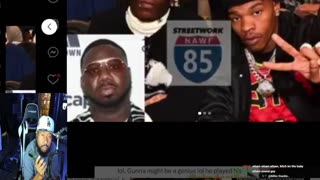 4:13:38
4:13:38
Akademiks
5 hours agoWar in RAT-LANTA. Young Thug vs Gunna vs Ralo vs YSL MONDO. Who Will Le Bebe Pick. FINAL CRASHOUT!
128K4 -
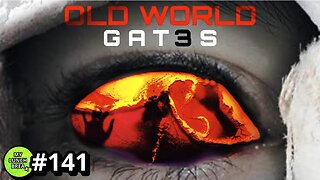 21:55
21:55
MYLUNCHBREAK CHANNEL PAGE
1 day agoFault Lines are GATES - Pt 3
13.7K6 -

Sgt Wilky Plays
3 hours agoRumble Gaming Bad Company Presents WARZONEPALOOZA
8.22K -
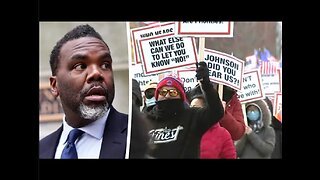 17:54
17:54
Nate The Lawyer
6 hours ago $1.88 earnedChicago Mayor’s $600M Migrant Spending Leaves City $1.1B Budget CRISIS.
13.1K26 -
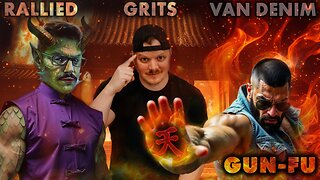 LIVE
LIVE
cosmicvandenim
16 hours agoVAN DENIM x RALLIED & GRITS | Team 6: Denim Grit | Warzonepalooza Tournament
264 watching -
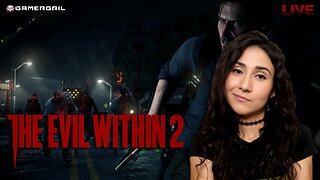 LIVE
LIVE
GamerGril
3 hours ago💕 The Evil Within 2 💕 | First Time Playthrough | Backseat Gaming Encouraged
71 watching